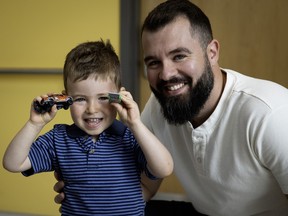“For far too many children with cancer, clinical trials are their only chance at survival,” says Dr. Catherine Vézina. A $1-million donation from Montreal’s Fuel Transport will help with that.

Eighty-five per cent of children in Quebec survive a cancer diagnosis, but 15 per cent do not. For those with rare, aggressive and difficult-to-cure cancers, clinical trials are crucial.
“For far too many children with cancer, clinical trials are their only chance at survival,” said Dr. Catherine Vézina, director of the hematology-oncology division at the Montreal Children’s Hospital. “By opening more clinical trials, we provide our young patients with better access to experimental treatments that could improve survival rates and reduce the harsh side effects of current treatments. These trials embody our commitment to improving outcomes and setting new standards in pediatric cancer care.”
“We are trying to address her frustrations,” Piccioni said.

Today there are 54 clinical trials open and recruiting, up from 34 two years ago. Nicole Sidhu, clinical trials manager in the hospital’s hematology-oncology clinical research unit, said the hope is to have more than 100 trials underway within five years, especially for rare cancers and blood disorders.
This expansion “marks a vital leap toward discovering better treatments, especially for the most challenging and currently incurable cancers,” the hospital said in a statement. “The goal is to give more patients, particularly those with hard-to-treat cancers, access to new drugs and treatment protocols that, in many cases, are the only hope of survival.”
“Today’s clinical trials often focus on targeted drugs for specific genetic mutations, allowing only a few children to qualify for enrolment,” Sidhu said in the hospital’s statement. “Opening a new trial is a complex process that takes up to 12 months, but with Fuel Transport’s generous donation, we can expedite this work. More clinical trials means more lives saved.”
Speaking at Wednesday’s news conference, Sidhu said only seven per cent of cancer research funding is devoted to pediatrics, despite the fact that 16 per cent of those receiving a cancer diagnosis are 18 or younger.
So far, the direct impact of the Fuel donation has been the hiring of an experienced research nurse as the clinical research unit team mentor, and the hiring of research pharmacy support to manage drugs for each clinical trial and provide safety monitoring and education to staff and patients on how to administer drugs. Patients in clinical trials are followed regularly and attentively.
Cancer is the leading cause of disease-related death among children. It affects about one Quebec child in 400 before the age of 15, more than half of them before their fifth birthday. A third have leukemia and the rest have lymphomas or solid tumours.
The cure rate for cancers such as leukemia has increased, said Vézina, but for other cancers, such as brain tumours, it has changed little. And clinical trials reach children only several years after they are accessible to adults, she said.
As well, more than 60 per cent of children treated for cancer experience long-term side effects. “We want to use treatments with fewer long-term side effects,” said Sidhu.
Immunotherapy, genetic therapy and targeted molecular therapy — which uses drugs or other substances to target specific molecules that cancer cells need to survive and spread — represent the future of treatment, Vézina said. “And clinical trials are the key to success.”

Among those attending the news conference were families with children who had been treated for cancer at the hospital. Dimitri Lappos was there with his three-year-old son, Jameson. He recalled the day the family learned Jamie had B-cell acute lymphoblastic leukemia: It was April 13, 2023, a Thursday.
“The word leukemia was like a bomb,” he recalled.
His wife, Kelley Kilganon, was heavily pregnant — the couple welcomed their daughter, Scarlett, soon after — and “it was a very difficult time for the two of us.”
Treatment began the following Monday and “I made it my job to make (Jamie) laugh and make the hospital a fun place; there were always snacks and toys. I did my job,” recalled Lappos. Treatments were “intense” for about nine months, but Jamie’s body reacted well to the different forms of chemotherapy.
The five-year survival rate for his type of cancer is high — 98.5 per cent, explained Lappos. Jamie will remain on a low, or maintenance, dose of chemotherapy until next June. He’ll be considered to be in remission if there is no relapse for five years from the time of diagnosis.
Said Piccioni: “It is really a testament to character where and how people step up when things get tough.”
And the cancer journey of people like Jamie Lappos and his family, he said, “is our collective responsibility.”